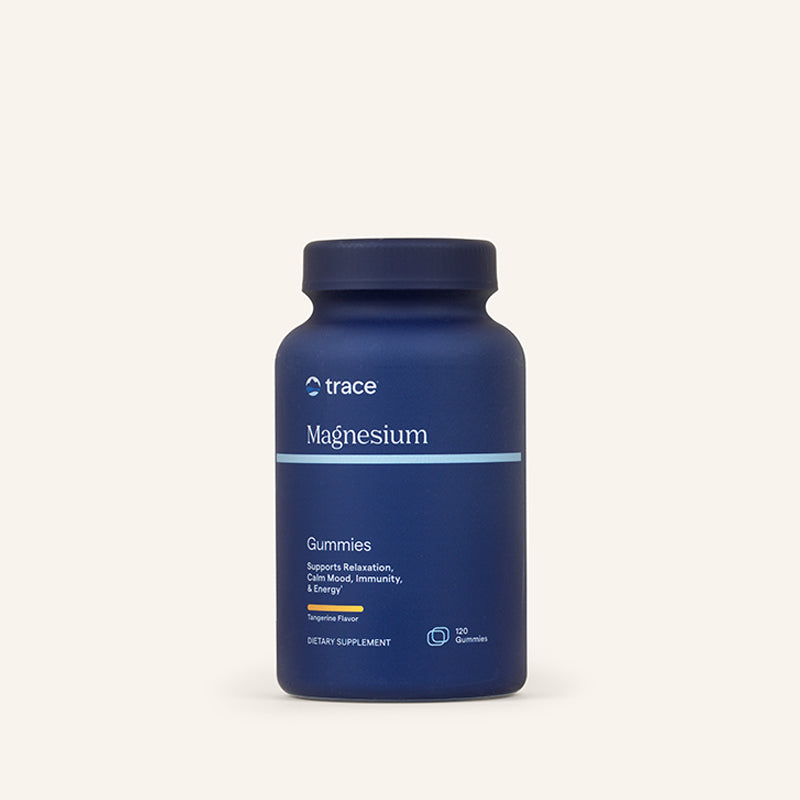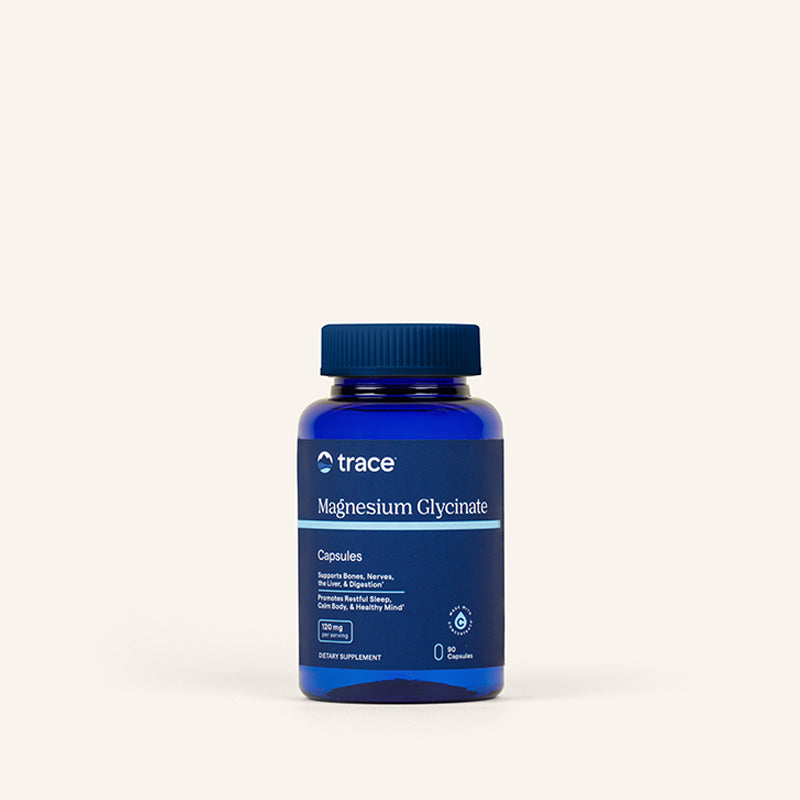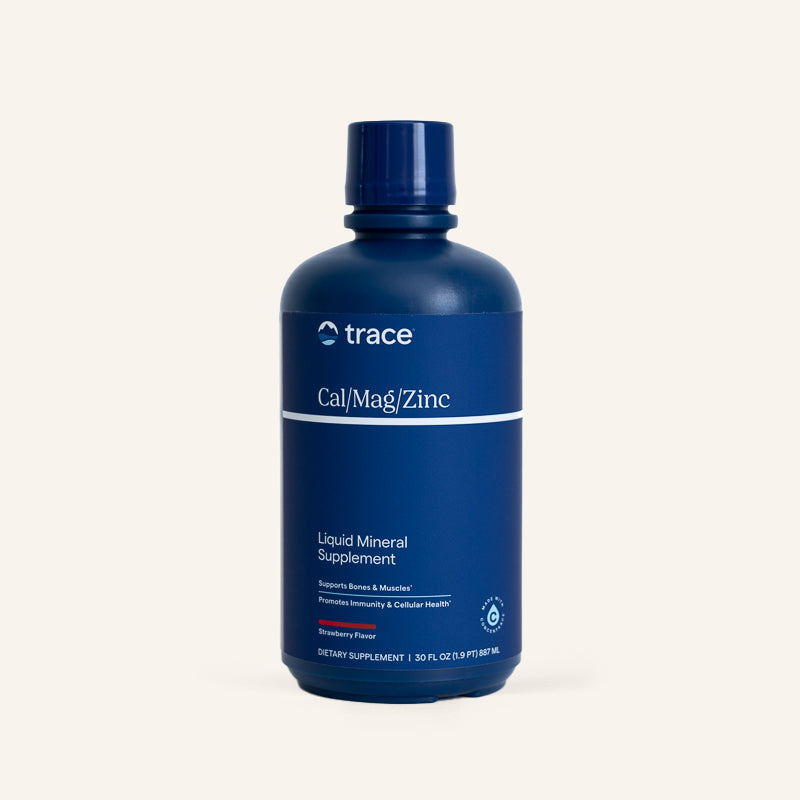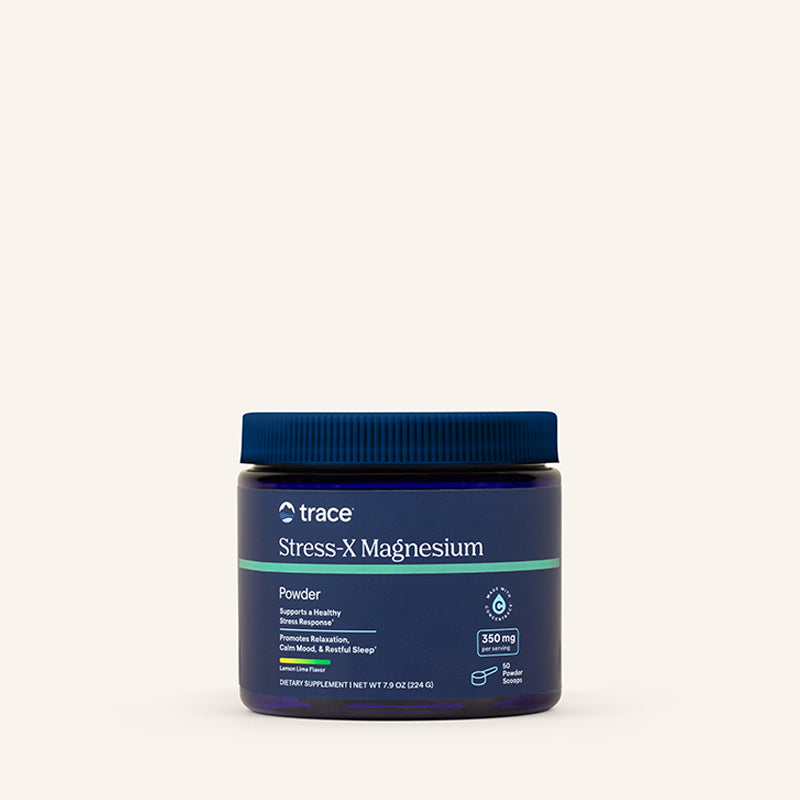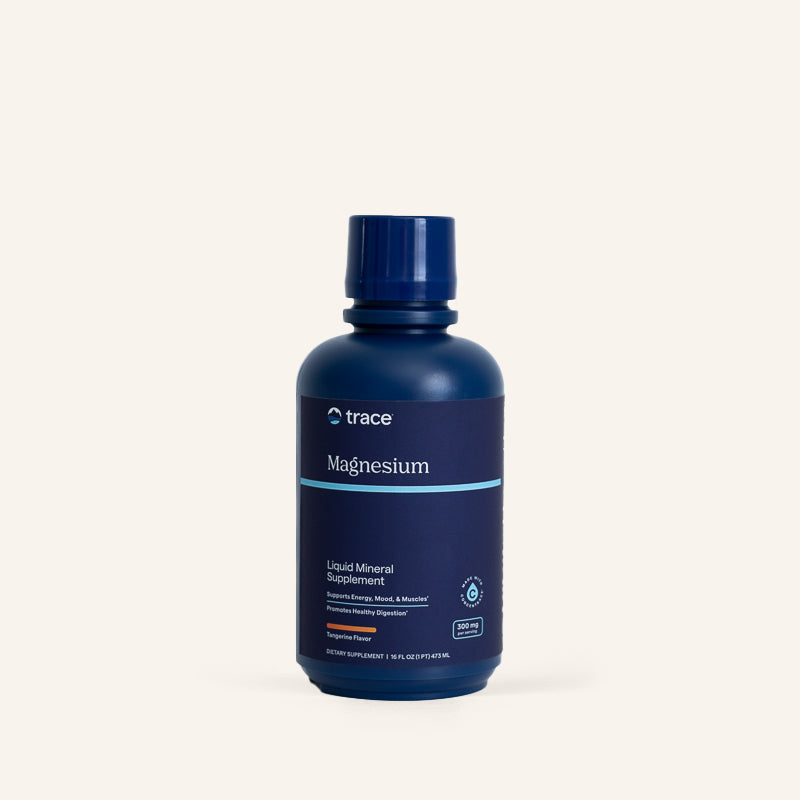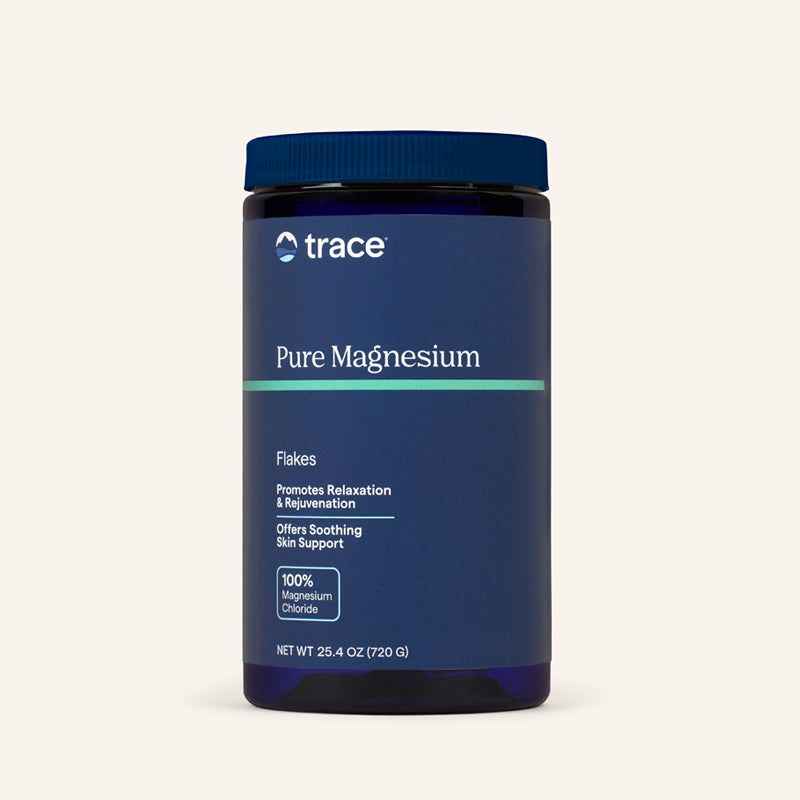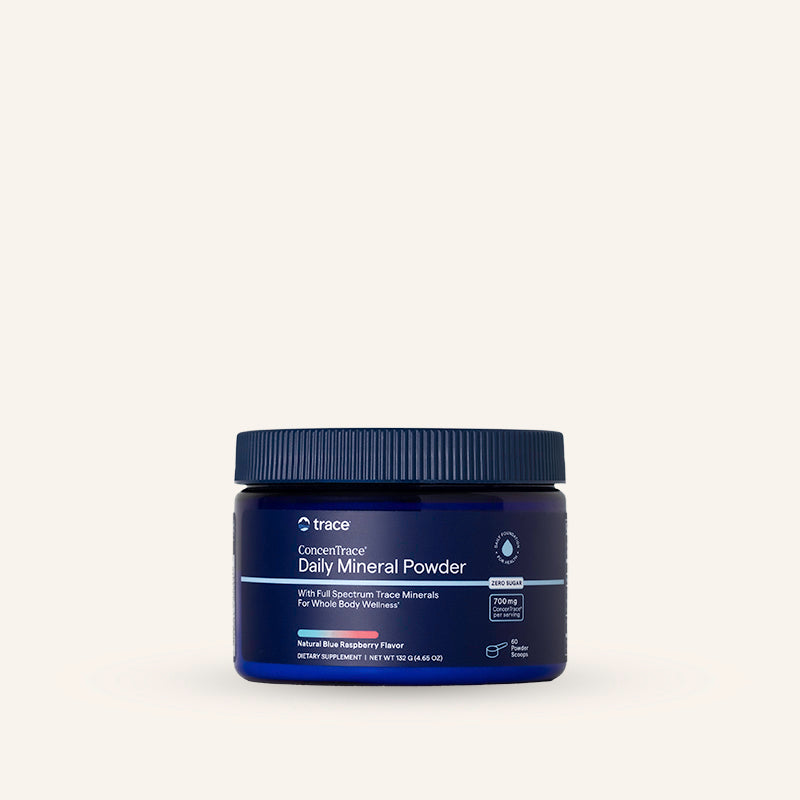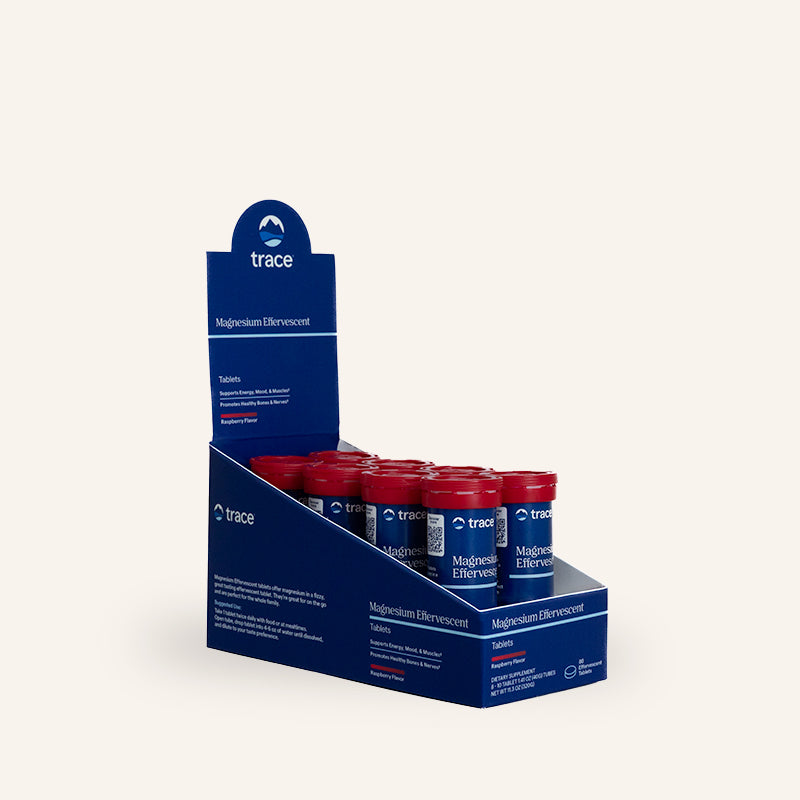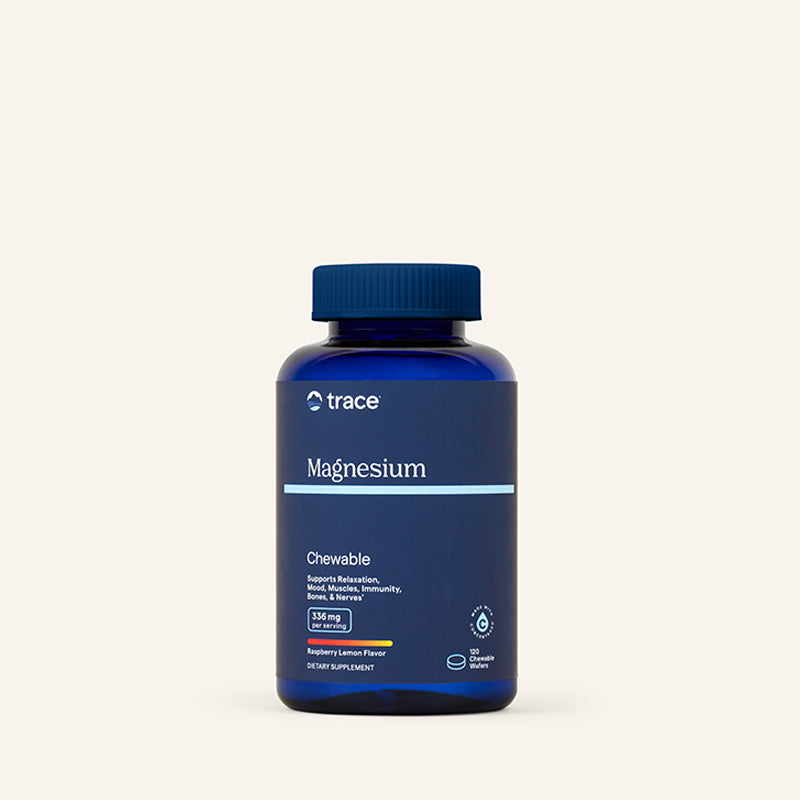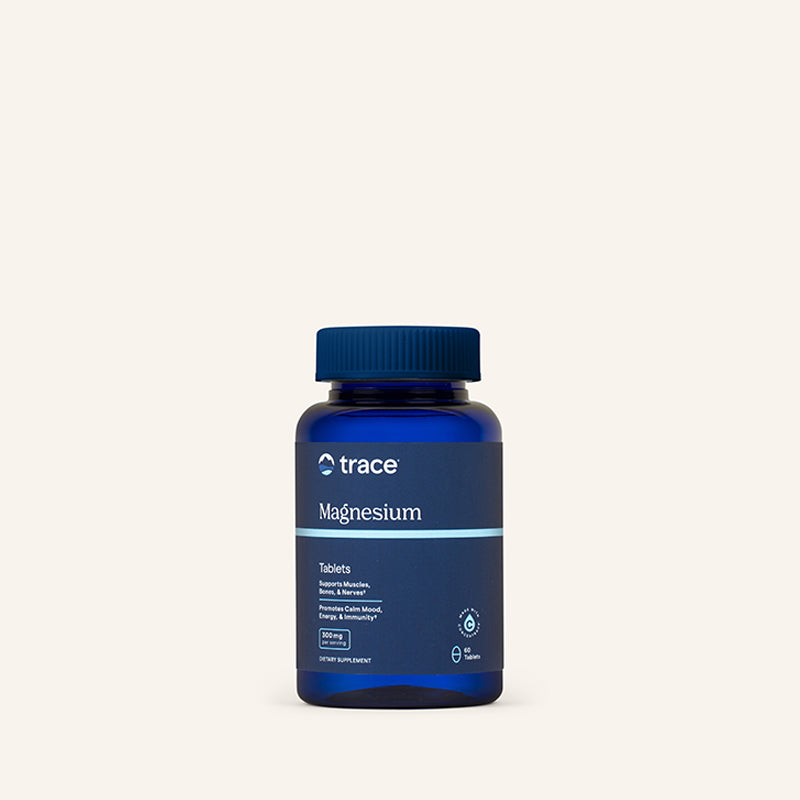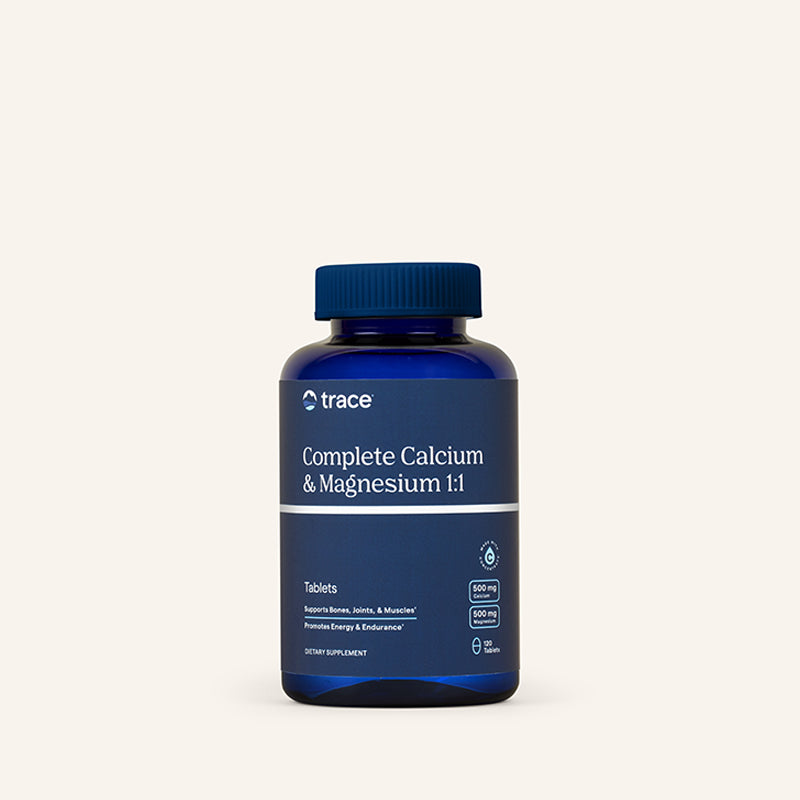Magnesium For Digestion
For over 50 years, Trace has been a trusted leader in mineral supplementation, providing high-quality, bioavailable minerals from nature. Our signature ConcenTrace formula delivers over 72 essential minerals, ensuring optimal absorption and effectiveness.
Filters
Filters
Benefits Of Magnesium For Digestion
Magnesium is often hailed as a powerhouse mineral, essential to many bodily functions, and crucial to digestion.
- Supports Regular Bowel Movements: Magnesium relaxes the intestinal muscles, helping to move stool through the digestive tract efficiently, reducing constipation, and promoting smoother, more comfortable digestion.
- Enhances Nutrient Absorption: By activating digestive enzymes, magnesium aids in breaking down food, ensuring essential nutrients are properly absorbed and utilized by the body for overall health and energy production.
- Reduces Gut Inflammation: Magnesium’s anti-inflammatory properties help soothe the gut lining, reducing irritation and discomfort, which can benefit individuals with digestive disorders or sensitive stomachs.
- Promotes a Balanced Microbiome: Magnesium supports a healthy gut environment by fostering beneficial bacteria growth, improving digestion, and enhancing immune function through better microbiome balance.
- Prevents Acid Imbalance: Magnesium helps regulate stomach acid production, preventing issues like acid reflux and indigestion while maintaining a healthy pH balance in the digestive system.
- Eases Digestive Discomfort: By calming the nervous system and relaxing digestive muscles, magnesium can help reduce bloating, cramping, and other digestive discomforts for a smoother digestive process.
- Supports Overall Gut Health: Magnesium contributes to intestinal barrier function, preventing leaky gut syndrome and ensuring that nutrients are absorbed while harmful substances are kept out of the bloodstream.
Support your digestive health with Trace Minerals. Our scientifically formulated supplements provide bioavailable magnesium and over 72 essential minerals to promote smooth digestion, nutrient absorption, and overall gut balance. Experience the benefits of a well-nourished body with high-quality magnesium sourced from nature. Make Trace a part of your daily wellness routine for long-term health and vitality.
Types Of Magnesium Supplements For Digestion
Understanding the types of magnesium supplements available can help you make informed choices for enhancing your digestive health. Each type has unique properties that cater to different aspects of digestive support.
1. Magnesium Citrate
Magnesium citrate is renowned for its high bioavailability, meaning the body absorbs it efficiently. This form of magnesium is a gentle laxative, making it a popular choice for those seeking relief from occasional constipation. Magnesium citrate naturally stimulates bowel movements by attracting water into the intestines, supporting regular digestion.
2. Magnesium Oxide
Known for its strong laxative qualities, magnesium oxide is often used to address more severe digestive complaints. While slightly less absorbable than magnesium citrate, it effectively treats indigestion and acid reflux, relieving digestive discomforts.
3. Magnesium Glycinate
Magnesium glycinate is celebrated for its calming effects on the digestive system. It combines magnesium with glycine, an amino acid known for its soothing properties. This form is especially beneficial for those who experience stress-related digestive issues, as it supports gut health and overall relaxation.
4. Magnesium Chloride
Magnesium chloride is highly soluble in water, making it another effective option for absorption and utilization by the body. This form supports proper digestion by helping to maintain stomach acid levels, thus enabling better food breakdown and nutrient absorption.
5. ConcenTrace®
For those looking for a comprehensive mineral boost, products incorporating ConcenTrace® can offer multi-mineral support, including magnesium. At Trace, we ensure that our ConcenTrace products integrate seamlessly with other nutrients to enhance absorption, ultimately leading to better digestive health. This innovation underscores our commitment to delivering the highest quality magnesium from the richest natural sources, like the mineral-rich waters of the Great Salt Lake.
With these varied options, you can select a magnesium supplement that best suits your digestive needs. Remember, the feeling is believing—choosing the right type can help you achieve and maintain better digestive health.
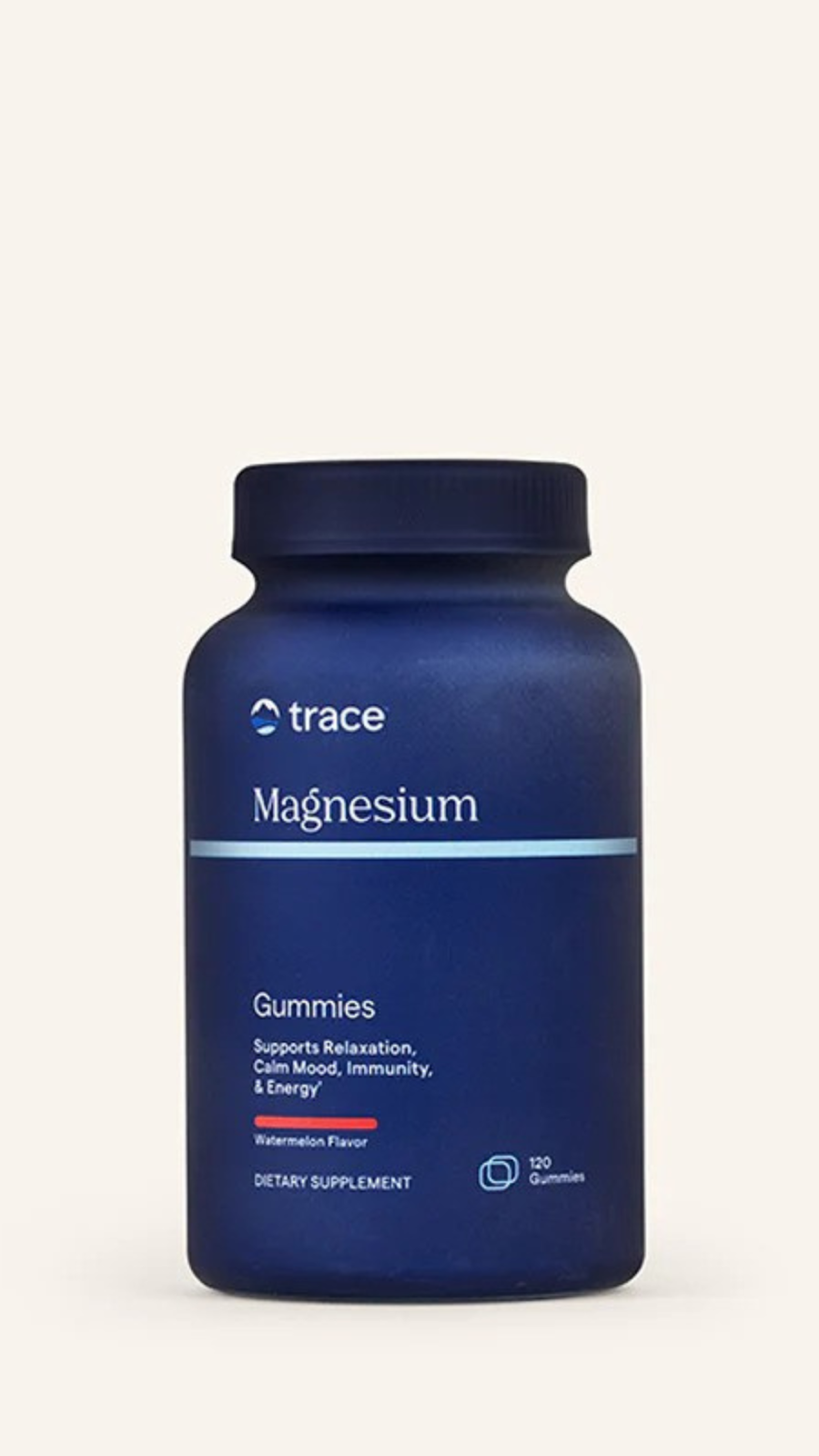
Factors That Affect Magnesium Absorption
When discussing magnesium for digestion, it's crucial to consider the factors that can influence how effectively your body absorbs this essential mineral. Absorption efficiency is not a static process but is subject to numerous variables that can enhance or inhibit how much magnesium your body retains.
Dietary Factors
The composition of your diet plays a significant role in magnesium absorption. High intakes of certain dietary components, like fiber, phytates, and oxalates, often found in grains, seeds, and leafy greens, can bind with magnesium and reduce its absorption. It's important to balance your diet to ensure you're consuming foods rich in magnesium, such as nuts and legumes, while also considering these inhibitors.
Gastrointestinal Health
The health of your gastrointestinal tract is equally vital. Conditions that affect the gut, such as inflammatory bowel disease, celiac disease, or chronic diarrhea, can impair the body's ability to absorb magnesium. Maintaining a healthy gut through proper nutrition and possibly consulting a healthcare provider is essential to ensure optimal mineral absorption.
Certain Medications
Specific medications, including diuretics, antibiotics, and proton pump inhibitors, can interfere with magnesium absorption. If you are on any long-term medication, it's advisable to speak with a healthcare professional to understand its impact on your magnesium levels and possible supplementation needs.
Age And Lifestyle
As people age, the efficiency of magnesium absorption tends to decrease. Regular high-intensity exercise can also lead to increased magnesium needs due to higher excretion rates. A proactive approach involving lifestyle adjustments and supplementation through trusted sources like Trace’s mineral supplements can support healthier magnesium levels.
Understanding these factors is crucial for anyone looking to improve their magnesium intake for better digestion and overall mineral balance. At Trace, we emphasize the importance of scientific excellence in all our products, ensuring that ConcenTrace and our wide range of mineral supplements support optimal absorption and health benefits.
How To Increase Your Magnesium Intake Naturally
Incorporating more magnesium into your diet can be a transformative step towards better digestion and overall health. Here are some effective ways to naturally enhance your magnesium intake:
Incorporate Magnesium-Rich Foods
Start by adding more magnesium-dense foods to your meals. Leafy greens like spinach and kale, nuts like almonds and cashews, and seeds like pumpkin and chia are excellent sources. Whole grains, particularly quinoa and brown rice, are also high in magnesium, supporting digestion and general vitality.
Leverage The Power Of ConcenTrace
At Trace, we believe the key to optimal mineral absorption is incorporating ConcenTrace into your daily routine. Our revolutionary mineral supplement is designed to synergize with your body's needs, enhancing magnesium uptake from food sources.
Opt For Water Rich In Minerals
Drinking mineral-rich water is another simple way to boost your magnesium levels. Our exclusive source taps into the abundant resources of the Great Salt Lake, ensuring that every sip supports your health goals sustainably.
Minimize Processed Foods
Processed foods can often be low in essential nutrients, including magnesium. Eating a diet less reliant on processed foods helps maintain magnesium levels and contributes to a more balanced nutrient intake overall.
By incorporating these methods into your lifestyle, you can ensure a consistent and natural increase in magnesium, supporting your digestive health and overall well-being. Remember, the feeling is believing; with the right foundation, your body can perform at its best.
Who Should Consider Magnesium Supplementation?
Magnesium is a crucial mineral vital in numerous bodily functions, including digestion. However, many individuals are not getting enough magnesium despite its importance due to dietary insufficiencies or increased physiological demands.
So, who should particularly consider magnesium supplementation?
Individuals With Digestive Disorders
Conditions like IBS, Crohn's disease, and celiac disease can impair mineral absorption, including magnesium. Supplementing with magnesium can help address potential deficiencies and improve digestive health.
People With High Stress Levels
Stress rapidly depletes magnesium stores in the body, which can lead to a vicious cycle of increased stress and further depletion. Magnesium supplementation may improve individuals' overall mood and digestive function.
People Consuming A Diet Low In Magnesium-rich Foods
Magnesium-rich foods include nuts, seeds, whole grains, and green leafy vegetables. If your diet lacks these foods, supplementation can help fill the gap and ensure you get the magnesium necessary for optimal digestive health.
Athletes And Active Individuals
Physical activity increases the body's demand for magnesium. Athletes lose minerals through sweat and increased metabolic activities. Adding magnesium to their regimen ensures that energy production, muscle function, and overall digestion remain at their best.
Older Adults
As we age, our body's ability to absorb nutrients efficiently diminishes. Magnesium supplementation can help maintain essential mineral levels, support healthy digestion, and counteract age-related declines in nutrient absorption.
At Trace, our ConcenTrace formula addresses these needs by providing a concentrated source of magnesium and other essential minerals. Using scientific excellence from start to finish, we ensure that our minerals and multivitamins meet the needs of those deficient and advance overall well-being. With our Feel the Difference Guarantee, we're confident you'll notice the impact of remineralizing your body with magnesium.
Read also:
- Zinc And Gut Health: How This Essential Mineral Supports A Balanced Microbiome
- What Type Of Magnesium Should I Take For Maximum Benefits?
- Is Magnesium Glycinate the Best Form of Magnesium for You?
Sources:
1. Aniebo Umoh, E., Obembe, A. O., Ikpi, D. E., Ekpenyong Eniang-Esien, O., Okon Asuquo, J., & Effiom-Ekaha, O. O. (2023). Effect of chronic administration of magnesium supplement (magnesium glycinate) on male albino wistar rats' intestinal (Ileum) motility, body weight changes, food and water intake. Heliyon, 9(8), e19042. https://doi.org/10.1016/j.heliyon.2023.e19042
2. Barbagallo, M., Veronese, N., & Dominguez, L. J. (2021). Magnesium in Aging, Health and Diseases. Nutrients, 13(2), 463. https://doi.org/10.3390/nu13020463
3. Souza, A. C. R., Vasconcelos, A. R., Dias, D. D., Komoni, G., & Name, J. J. (2023). The Integral Role of Magnesium in Muscle Integrity and Aging: A Comprehensive Review. Nutrients, 15(24), 5127. https://doi.org/10.3390/nu15245127
4. García-Legorreta, A., Soriano-Pérez, L. A., Flores-Buendía, A. M., Medina-Campos, O. N., Noriega, L. G., Granados-Portillo, O., Nambo-Venegas, R., Tovar, A. R., Mendoza-Vargas, A., Barrera-Oviedo, D., Pedraza-Chaverri, J., & Palacios-González, B. (2020). Effect of Dietary Magnesium Content on Intestinal Microbiota of Rats. Nutrients, 12(9), 2889. https://doi.org/10.3390/nu12092889
5. Fiorentini, D., Cappadone, C., Farruggia, G., & Prata, C. (2021). Magnesium: Biochemistry, Nutrition, Detection, and Social Impact of Diseases Linked to Its Deficiency. Nutrients, 13(4), 1136. https://doi.org/10.3390/nu13041136
For detailed benefits and recommendations, browse our ConcenTrace mineral supplement range to support your wellness journey.
Frequently Asked Questions
Magnesium is a vital mineral that plays a crucial role in numerous bodily functions, including digestive health. It helps maintain normal muscle and nerve function, essential for the smooth operation of the digestive tract. Magnesium aids in enzyme activation, which is necessary for breaking down food and ensuring nutrients are properly absorbed.
Yes, magnesium is known to be effective in treating constipation. It acts as a natural laxative by relaxing intestinal muscles and attracting water into the intestines, which helps soften stools and stimulate bowel movements. Specifically, magnesium citrate and magnesium hydroxide are commonly used to alleviate constipation.
The appropriate dosage of magnesium can vary depending on individual needs and the issue being addressed. It's generally recommended to consult with a healthcare professional to determine the appropriate dosage for your situation. However, the typical adult dosage for treating constipation ranges from 200 to 500 mg of magnesium, taken once or in divided doses throughout the day.
Magnesium supports digestive health by assisting in nutrient absorption, maintaining healthy intestinal muscle function, and regulating the balance of gut flora. It ensures that your body effectively processes and absorbs the nutrients from your food, contributing to overall digestive wellness.
Signs of magnesium deficiency can include muscle cramps or spasms, fatigue, irritability, and poor digestion. In terms of digestion, a deficiency may lead to symptoms such as constipation, bloating, and a reduced ability to absorb nutrients, which can affect overall health properly.
You can obtain magnesium from various food sources, such as leafy green vegetables, nuts, seeds, whole grains, and legumes. However, due to soil depletion and dietary choices, many individuals find it challenging to meet their magnesium needs through diet alone. In such cases, supplements like Trace's magnesium products can effectively ensure adequate intake.

